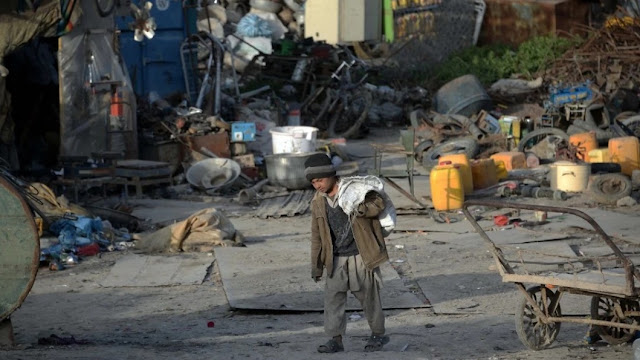Ban on import of metal scrap from Afghanistan, fear of closure of steel mills in Balochistan
The Afghan Taliban have seized Kabul and banned the export of hard metal scrap abroad, which could affect the iron and steel industry in various parts of the country, especially in Quetta, and increase the prices of iron goods, including construction materials. Has been created.
On Sunday, the Taliban's Economic and Financial Affairs Commission banned the export of used and scrap metal from abroad. A statement issued in this regard directed the Afghan customs authorities to implement the restraining order.
The statement further said that "there is a large availability of low-cost scrap iron in the country which is being taken abroad by the traders while the factories and industries in the country are in dire need of this iron."
According to people associated with the iron industry, 70% of the required iron ore is imported to Pakistan while 30% of the requirement is met by metal scrap produced in the country. Imran Khan Kakar, vice-president of the Pak-Afghan Joint Chamber of Commerce, told Tameer News that 1,000 to 1,200 tonnes of scrap metal arrives from Afghanistan every day via Chaman. In addition to iron, they contain aluminum, copper, and other metals, but most contain iron.
"The iron goes to kilns and steel mills in major cities of the country, including Quetta, Peshawar, Multan, Gujranwala, and Lahore, where they are melted down to make construction materials and other materials."
Abdul Waris, Chaman's clearing agent, said that trucks already loaded with scrap iron were being allowed to enter the Afghan area of Spin Boldak, near the Chaman border, but that new arrivals were not being allowed by the Taliban due to restrictions.
He said that thousands of people including traders, transporters, laborers, and clearing agents on both sides of Afghanistan and Pakistan are employed in scrap metal. If this ban is maintained, all these people will become unemployed.
According to Abdul Waris, the Taliban have also increased the tax on scrap many times over the previous government.
Earlier, a tax of Rs 30,000 to Rs 40,000 was levied per truck. As soon as the Taliban arrived, they started levying a tax of Rs 2.5 lakh on a ten-wheeler truck and Rs 4 lakh on a trailer. Similarly, three weeks ago, Pakistani customs It has been increased from Rs 15,500 per ton to Rs 27,000 per tonne, which has increased the price of iron ore.
According to him, substandard scrap comes from Afghanistan while good quality iron ore comes from the United Kingdom, United Arab Emirates, and other countries through the port of Karachi. Pakistani authorities have imposed equal customs duties on both, which is an unfair decision.
Iron from Afghanistan rusts loses weight as it loads and unloads at the border and reaches kilns and factories.
Aminullah, the owner of a private steel mill in Quetta and vice-president of the Balochistan Industrialists Association, told Tameer News that the closure of imports of metal scrap from Afghanistan has raised fears of closure of Quetta's steel mills. He said that a large portion of the scrap coming from Chaman is used in eight mills in Quetta, with the average daily consumption of each steel mill being 100 tons.
According to Aminullah, 400 to 500 people are working in each steel mill in Quetta. If the steel mills close, all these people will become unemployed and the prices of Surrey, TR, and Girder will go up in the local market. ۔
He said that iron ore imported from UK, USA, UAE, and other countries through Karachi port is expensive. Karachi's mills have lower production costs due to higher consumption and lower transportation costs.
"If scrap from Afghanistan stops coming, our production costs will go up and we will not be able to compete with the mills in Karachi. Our business will end."
According to Afghan media, just days before the Taliban imposed the ban, Abdul Nasser Rashtia, head of the Afghanistan Steel Mills Association, expressed concern over scrap smuggling and exports abroad and feared a shortage of raw materials. More than 40 steel mills in Afghanistan will close and 5,000 people will lose their jobs.
Abdul Nasser Rashtia said that with the reopening of borders after Taliban control, Afghanistan's scrap was being smuggled to neighboring countries due to which steel mills were facing a shortage of raw material.
When Soviet troops withdrew from Afghanistan in the late 1980s, many of their tanks, trucks and military equipment left Afghanistan, accumulating a vast stockpile of metal scrap that was brought to Pakistan and sold.
According to a US news agency report, when the withdrawal of US and NATO forces began in 2014, 176,000 tonnes of scrap were sold in the local market for Rs 7 billion.


Comments
Post a Comment